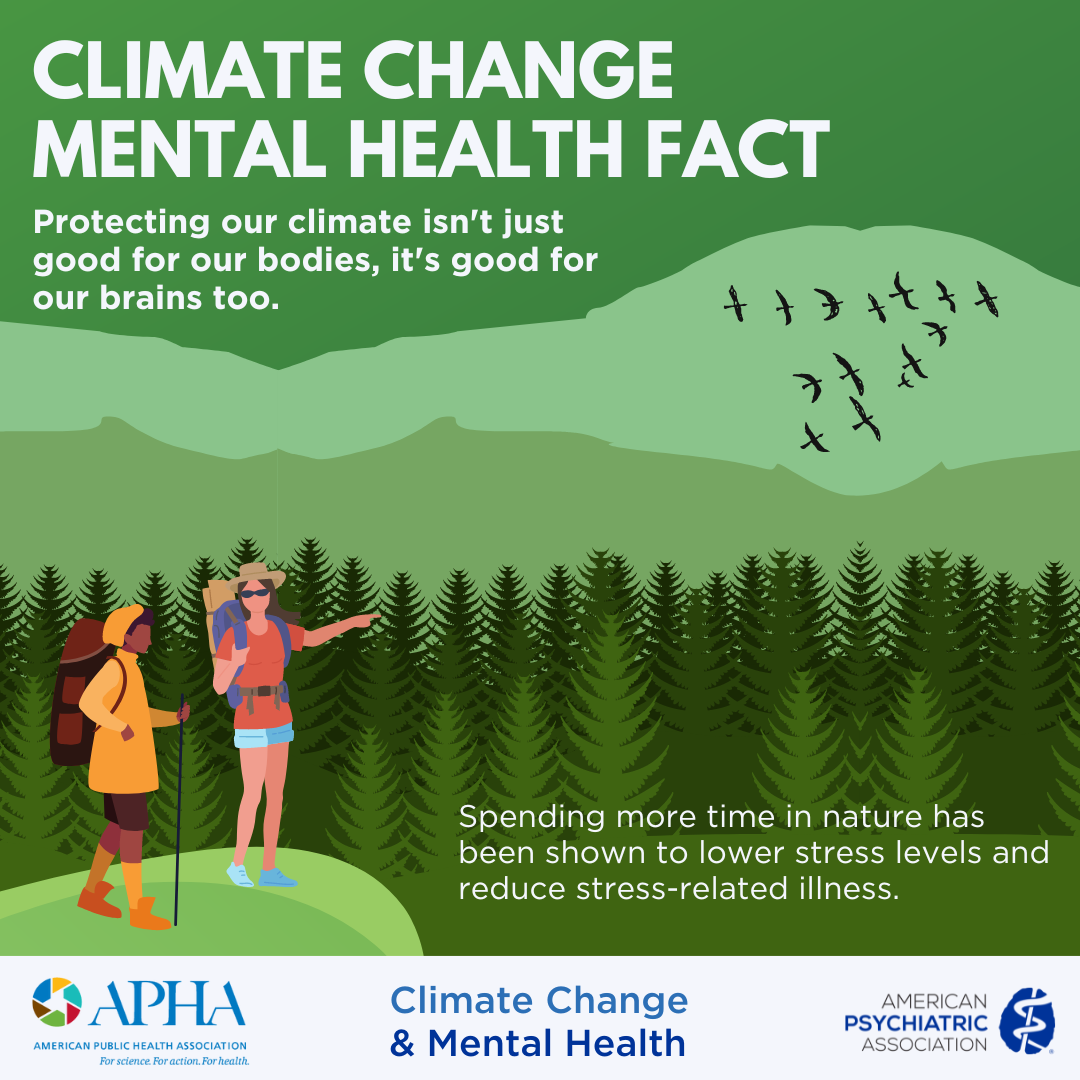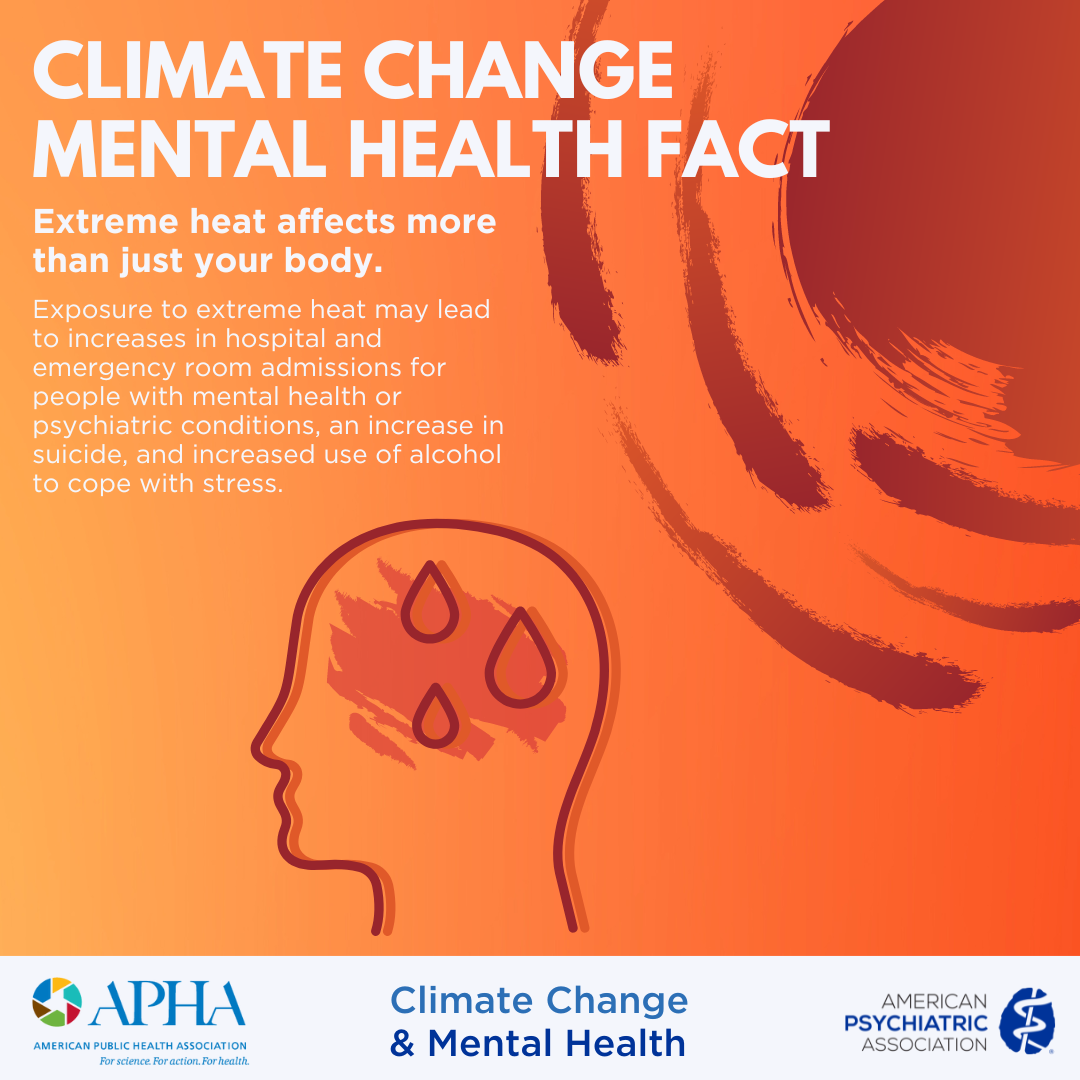Addressing the Public Mental Health Challenge of Climate Change
For most Americans, the face of climate change is extreme weather and natural disasters. More than 40% of Americans live in a county impacted by a major natural disaster in the last year. In the last seven years, natural disasters cost the United States more than a trillion dollars in damage and more than 5,000 lives were lost.

Numbers, however, only hint at the full toll. These disasters bring significant upheaval and multiple other kinds of trauma to communities: permanent pain and injury, loss of community ties as people are forced to move away, depleted community funds for schools, parks and events that would usually help people connect and thrive as resources go to repairs, and others. Over time, inequitable recovery - some suffering more than others due to location, lesser insurance, lack of a financial safety net or people that can see them through - creates strain between neighbors, neighborhoods, and family members. Under these conditions, most people experience stress, disruption of sleep, and often physical symptoms like headaches and GI distress.

Over time, depression and PTSD rise, and there is more substance abuse, child abuse, and domestic violence. All told, the number of people who experience a mental health problem as a result of a natural disaster often outweighs those with physical injuries by a stunning 40 to 1.
Impacts of this scale are called “population level traumas,” like the COVID-19 pandemic, systemic race-based violence, and pervasive gender, economic, and other forms of injustice. Population-level traumas like these, along with climate change and environmental injustice, put the entire population in need of mental support and strategies for appropriate coping. In the case of climate change, this means cultivating both resilience and emotional and cognitive transformation, as we seek new ways to live in our changing reality. We must build mental and emotional resilience alongside physical resilience in our systems as we experience more and more frequent climate disasters.

Further, many people also experience ongoing stress that comes with worrying about the future, often referred to as eco-anxiety. Eco-anxiety is experienced most prevalently by young people.
Despite the population-wide mental health need, more than 150 million people in the U.S. live in federally designated mental health professional shortage areas. Our human services and mental health systems are not capacious enough today to assist the one-fifth of Americans who experience mental health problems already in need, and this gap will only grow over time. In addition, many people do not engage in treatment due to high costs, fears of being stigmatized, injustices embedded in the mental health system, and other reasons.
Community Initiatives
For these reasons, the American Psychiatric Association and the American Public Health Association have partnered on this blog, united around the need for more national public health and community-based initiatives to develop mental wellness and resilience in all people.
The goal of community-based mental health initiatives is to build pre-traumatic mental resilience and robust social interactions that will support individual wellness when stressed by population traumas like climate change - or gun violence or any other pervasive stress. A number of targets to help do this have been developed by an initiative of the APHA’s Center for Climate, Health and Equity:
- Creating awareness. Create universal awareness about mental health and wellness for all ages through education, trainings, workshops, community gatherings and public messaging.
- Mapping vulnerabilities. Map the social and physical vulnerabilities of the community.
- Healing trauma. Establish a layered and diverse set of adaptable and culturally appropriate opportunities to heal trauma (such as support groups, healing circles, expressive therapies, nature-based therapies, memorial events, etc.) that will appeal to various community groups and ages.
- Focusing on vulnerable groups. Create targeted initiatives for vulnerable and marginalized groups, such as pregnant mothers, children, Black people, Indigenous people, other People of Color, people with pre-existing health conditions, etc.
- Making environments more resilient. Focus on environmental efforts that make communities and their habitats more resilient: water management, parks and lands preservation, greenhouse gas emission reduction and ecosystem restoration in ways that also provide opportunities for work and play for residents.
- Providing training. Train the trainers: train community leaders in past and historical traumas; train community organizations in evidence-based skills and tools that support self-regulation, co-regulation, community building and self-expression.
- Asking for input. Ask for continuous feedback and change strategies as helpful.
- Using social media. Engage with media and social media to bring this all to others.
Legislative Initiative
The APA has supported new legislation, the bipartisan Community Mental Wellness and Resilience Act of 2023 (CMWRA) recently introduced by Representatives Paul Tonko (D-NY) and Brian Fitzpatrick (R-PA). The proposal has been several years in development and is supported by the International Transformational Resilience Coalition, a coalition of mental health organizations. It establishes a competitive small grant program at the CDC to create, operate, or expand community-based programs that use a public health approach to build mental wellness and resilience.
APA CEO and Medical Director Saul Levin, M.D., M.P.A. has said about this legislation: “This forward-thinking proposal would authorize grants focused on strategies to enhance the ability of communities to confront the mental health impacts of acute and long-term disruptions from natural disasters, as well as other public health impacts of climate change. APA strongly supports this effort to foster resilience and mental wellness in communities across the nation.”
Global Initiative
At a global level, the COP2 program (Care of People x Planet), recently established by the Council of Parties (COP) Race to Resilience and led by APA Member Gary Belkin. M.D., is also creating a global network of regional hubs helping organizations grow capacity for psychological resilience with a target goal of 4 billion people.
The goal of all of these efforts is to provide expertise and funding for the kinds of locally relevant, innovative, and embedded work that people in their communities are already doing: working to keep people connected to their lands and their communities in ways that foster long term care and protection of our earth, its resources and inhabitants, and each other.
More information
- APHA: Making the Connection: Climate Changes Mental Health (.pdf)
- APA: Climate Change and Mental Health Connections
- Climate Psychiatry Alliance
- World Health Organization: Climate Action Must Include Mental Health
- National Institute for Health Care Management (NIHCM) Foundation - Climate Change is Affecting Out Mental Health
